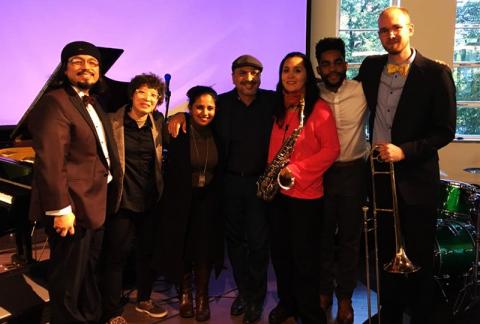Students Connect Music and Nature at Americas Latino Eco Festival

From left to right: Orión Morales Gonzalez, Seulgi Hwang, Sujatha Rajasekar, Marco Pignataro, Patricia Zárate, Alix Goffic, PJ (Arvid Per Johan) Andersson.
Sophie Maricq
This semester, Berklee Global Jazz Institute (BGJI) students traveled to Denver, Colorado to be part of the Americas Latino Eco Festival, presenting not only the event's closing concert, but also an eco-friendly workshop featuring activities such as designing percussive shakers from recycled materials.
The Americas Latino Eco Festival—a free, nonprofit event open to all—is a Latino-hosted multicultural event that elevates the voices of communities of color and of women in conservation and cultural leadership. The goal is to foster collaboration to better tackle environmental problems from many angles, and using art and culture to share environmental awareness and values.
The students traveled with Patricia Zárate—a saxophonist, music therapist, and executive director of the Panama Jazz Festival who started the outreach programs of the institute—and Marco Pignataro, a saxophonist, educator, and managing director of the BGJI. Participating in the event aligned well with the BGJI goal of connecting music with nature. BGJI students explore nature as a source of sound, rhythm, harmony, and musical expression, and discover ways the natural world can influence creativity and imagination. One of the program’s goals is to promote interactions with indigenous cultures and to create awareness about the importance of ecological restoration.
For the Denver trip, students were asked to compose a song about a species or a natural resource from where they were born that faces possible extinction or ruination, with the goal of creating awareness. What follows are the students’ words and motivations for their compositions.
Arvid Per Johan (PJ) Andersson, trombonist from Sweden:
“Back in the day, the people found that pine trees were the most profitable trees to export. Therefore, all farmers started cutting down leaf trees to make more money. This made it hard for many species to survive because of the thick pine woods and especially hard for the white-backed woodpecker. The greed of the people almost killed all the birds until today, when we have started to reverse the process, in hopes to help the species recover. I wrote a waltz trying to capture the sadness of the loss, but also some regret and the hope to make things better. The drummer imitates the pecking of the trees.”
Alix Goffic, drummer from French Guyana:
“I wrote a piece about the giant otter of Amazonia. This animal is really hard to study because of the few numbers of them left. The destruction of their environment is one of the main reasons why the giant otter is an endangered species. Pollution of the rivers, deforestation, and destruction of the aquatic environment are the main threats for this species, [which] needs really clean and healthy water to live.”
Sujatha Rajasekar, vocalist from India:
“The seed for my idea came from my involvement with a citizens’ movement to save the Narmada River in India from what was the ‘greatest planned environmental disaster’—because of the construction of a modern dam that would bring water to city people but would destroy the lives of communities connected deeply to the river and displace millions of communities living by the river.
It would also change the ecology of the river, alter its course, and have deeply harmful environmental repercussions. The name Narmada means ‘giver of pleasure,’ and its etymology also means ‘a new beginning.’
I have composed the melody for the tune and based it on a raga with an unusual flow, with twists and turns much like the river itself. For the lyrics, I chose an old Sanskrit poem about the river and changed the meter.”
Seulgi Hwang, bassist from South Korea:
“I worked on a tune about the power of nature. Nowadays, humans are not only using/living in nature, but they seem to also own it. I believe that we are not allowed to own it. We can use it, but it needs more respect. I wanted to express this in my song.”
Orion Morales Gonzalez, pianist from Chile:
“My song is inspired by the Elqui River, in a beautiful place in Chile. This river crosses Chile, from valleys to the sea. In [recent] years, it was discovered [that] mining companies polluted the river, and people protested for the closure of these companies.
The spirit of the song is [inspired by] the way the Elqui [moves] until reaching the Pacific Ocean.
